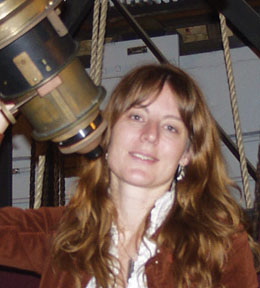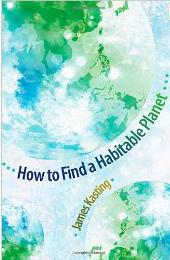Ever since Galileo first turned his telescope to the night sky, people have dreamed of discovering life on other planets besides our own. For centuries, very little progress was made. In the mid-twentieth century, after the canals on Mars had proved to be illusions, extraterrestrial life seemed more remote than it had at any time since Galileo.

Lisa Kaltenegger at the eyepiece of Harvard Observatory's historic refractor.
Christine Pulliam / CFA
All of that changed with the discovery of the first extra-solar planets.in the 1990s. Finally what many people had assumed all along was proved to be true —our galaxy is teeming with planets — billions of them. Out of that huge number, surely some must physically resemble our own Earth. But do any of these Earth-like planets have life? Could we detect it if they did?
To help answer these questions, Lisa Kaltenegger of the Harvard-Smithsonian Center for Astrophysics has been studying Earth's past. Her aim is to fiigure out what Earth would have looked like to extraterrestrial astronomers at different points during its evolution. There's no guarantee that a life-bearing exoplanet would resemble Earth during any of these phases — but it's a good place to start.
We recorded Sky & Telescope chief editor Robert Naeye interviewing Kaltenegger on her work and its implications. Kaltenegger's personal belief — which she admits is based more on instinct than solid evidence — is that intelligent life is widespread, but may look very different from our own. She also points out that discovering earthlike planets could be tremendously helpful for understanding Earth. Click here to download Kaltenegger's 20-minute, 9-megabyte podcast.

Penn State

Princeton University Press
James Kasting (Penn State University) is an expert on the evolution of planetary atmospheres and is actively involved in NASA's search for extra-solar planets. He's also the author of a newly published book: How to Find a Habitable Planet
In a fascinating interview with Naeye, Kasting discusses Earth's past and its implications detecting extraterrestrail life. Kasting's wide-ranging speculations range from the technology required to detect exolife to the recent claim that Earth's habitability results from a rare set of coincidences. Kasting suggests that it may be easier to detect life outside our solar system than within it. Click here to download Kasting's 18-minute, 8-megabyte podcast.
 0
0

Comments
You must be logged in to post a comment.